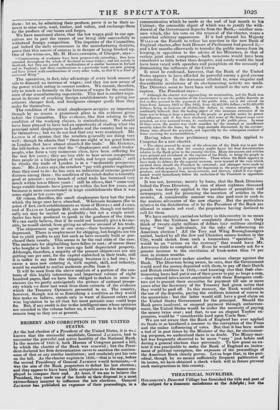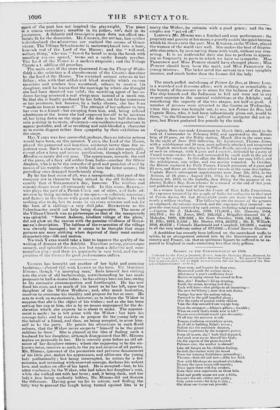THEATRICAL NOVELTIES.
GOLDSMITH'S Deserted Village has furnished the title and part of the subject for a, domestic melodrama at the Adelphi; but the spirit of • the poet has not inspired the playwright. The piece is a •cearse• carieature; maudlin in its pathos, an?-s dull, in its jecoseness. A' didactic and des.eriptive poem; does; not afford mas serials fit liar the dramatist. MnCoonsn, the author, has-neither individualized. the +characters nor realized the scenes of GOLD- *SliEl TH. The Villnee Schoolmaster is metamorphosed into a busy, knavish tcol or the Lord of the Manor; and the " widawed, solitary thing," who was " forced for bread 'to strip the brook with mantling • cresses spread," turns out a -crafty female poacher. Tim Lo. d of' the Manor ia a modern exquisite; and the Village (..7nrate a t addling old preacher.
The main story of the piece (borrowed from the Vicar nf Wake- 4e1d) is the seduction aial abandonment of the Curate's daughter by the Lord of the Manor. The wretched outcast returns to her fathers who, with that selfish and bliad morality which custom sanctions and renders less unnatural, refuses to receive his daughter, until he learns that the marriage by which she thought shelled been deceived was valid; the unwilling agent of her se- ducer haying procured a real clergyman instead of a mock one: 'Solhat she is finally pardoned by her father, not for her innocence
• or her penitence, but because, by a lucky chance, she has been made an honest woman or The attempt of her seducer to turn her over to a friend—her escaping from him, and, being refused
• admittance at the house she had supposed herself to be mistress of, her lying down on the steps of the door in her ball-dress (the rain neuritic, in torrents, of con rse)—are incidents too g ratu itous to appear probable, and of so revolting and cold-blooded a character as to excite disgust rather than sympathy by their exhibition on
the stage. •
• Mrs. YATES was less successful, perhaps, than an inferior actress would. have been, on this account. YATES, the Lord of the Manor, played the pampered and heartless aristocrat better than the re- pentant man. Such a character, indeed, could not alter materially, escept after a long and severe purification, through which Lord Maiden certainly did not pass. The appearance, towards the end of the piece, of a fiery old soldier front lndia—another Sir Oliver Suiface, who is to he the rewarder of good and punisher of evil by means of his wealth—threw a little life into the latter scenes; the preceding ones dragged lugubriously along.
By far the best scene of all, was a masquerade; that part of the company not in character being attired in the old fashion—not exactly that of GOLDSIIITHS day, however. The cotillon and country-dance went off extremely well. In this scene, REEVE,— who plays the part of a Parish Clerk out of office, and finds ad- mission by being mistaken for a masquen—is infinitely amusing; and figures in the dance with great spirit and lightness. He had nothing else to do, but to come in on every occasion and ask liar the loan of a shilling—a very dull joke. .BUCKSTONE as the Schoolmaster could not help being disagreeable. The scene of' the Village Church was ps picturesque as that of the masquerade was splendid. "Sweet Auburn, loveliest village- of the plain," did not glow on the canvas with the genuine vividness of GOLD-
nis description. The tableau of the evacuation of the village. was cleverly managed; but it seems to be thought that stage pictures are more striking when deprived of their most natural characteristics—life and motion.
We wish YATES would take a hint to improve the quality of the writing of dramas at. the Adelphi. Excellent acting, picturesque scenery, and splendid dresses, are lost upon a defective and com- monplace play : and then its popularity is very brief, and the re- putation of the theatre for good peiformances suffers.





















 Previous page
Previous page